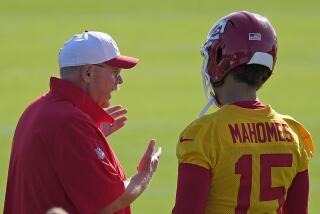A New World Coming : Free Agency: Everyone agrees a system is on the way, but few are sure what the effect will be.
- Share via
Looming on the horizon is a vast wilderness for the NFL, whose boundaries for so long have remained tried and true.
Free agency, the concept that pro football has, alone among major sports, avoided, is in the league’s future. And it is a whole new world out there.
So, skipping past all the legal intricacies and bargaining maneuvers that most observers believe will result in some variation of veteran free agency by 1993 at the latest, what will happen?
How will the league absorb this newfangled system? Will it mean the end of the line for traditional franchises such as the Green Bay Packers and the Cleveland Browns?
Or will the post-free-agency era in the NFL be an age of enlightenment, with the players and the league sharing happily in the bounty and ending their bitter war?
“It will be different,” agent Leigh Steinberg says with a big grin.
For months now, buoyed by a desire to avoid the trials set to begin in several individual player lawsuits against the league’s free-agency restrictions, enough important people are discussing the matter, tossing out trial balloons, trying to make something solid out of the possibilities.
Even the hardest of the league’s management hard-liners quietly accept the inevitably of some version of veteran free agency, a proposal they have fought through so many battles.
“Yes, I’d have to say I think there probably will be free agency at some time,” says Tex Schramm, former general manager of the Dallas Cowboys and the NFL’s staunchest enemy of the concept.
“Hey, the world’s changing. Some things, you have to live with in a different way.”
The intriguing part is figuring out how different it will be. What follows are some of the larger issues.
Will It End Competitive Balance as We Know It?
If neither side goes for the big knockout victory and they come to a compromise agreement, many on both sides see free agency occurring simultaneously with measures to limit the possibility of disaster striking the Packers, Browns and other cold-weather, small-market franchises.
Schramm says that when he presented his doomsday scenario to ownership about free agency, he pointed out that the ability of certain powerful teams to load up on all available talent was the best argument against it.
“The players will gravitate toward not only the places that are successful, but they’ll gravitate towards the cities that have more to offer outside of football,” Schramm says, “and that sure isn’t Green Bay.”
But with the league in a more moderate mood toward free agency now, and all those lawsuits pending, free agency with limitations is a concept that the NFL can consider without great pain.
“I see several possibilities for systems of free agency that would enable veteran player movement without creating a deterioration of competitive balance,” says Harold Henderson, NFL executive vice president for labor relations.
“With some limitations, I don’t think there would be any real trauma involved. The game will be played as it is now.”
Henderson presents several scenarios, all involving an NBA-style salary cap as a quid pro quo for free agency, and limits that might include varied time periods, a rookie wage scale and allowing teams to keep players from becoming free agents if they are paid more than a certain salary level.
Under such provisions, for example, running backs might be granted free agency after three seasons because their careers are usually short. Quarterbacks, because their careers are relatively long and because of their value, might not get free agency for seven or more seasons.
Steinberg foresees a salary cap, free agency for all veterans after four or five seasons and a guaranteed minimum amount that a team must spend on its players tied to a percentage of their gross revenue.
Players will move at random, according to Steinberg, because they will go where they can start, and it would be useless to join a powerhouse team if a player can’t win a starting job.
Some teams will still struggle financially, he says, but because of bad choices, not free agency. Steinberg and the NFL Players Assn. point to the acquisition of players by the Packers, the Browns and the Kansas City Chiefs during Plan B free agency. With a liberalized free - agency system, it won’t be much different, they contend.
“Every team in that system will have the same amount of money to spend,” Steinberg says. “So there’s no possibility to have one team dramatically outspend another.”
Doug Allen, assistant executive director of the NFLPA, argues that pro basketball and baseball, both with free agency, have had more balance than the NFL.
“The major difference is they have free agency, and the NFL does not,” Allen says. “Free agency is good for competitive balance, not bad.
“Hey, the Yankees bought all the best pitchers and hitters all those years and won all those World Series, right? Listen, George Steinbrenner’s millions didn’t make it happen, and neither will (San Francisco 49er owner) Eddie DeBartolo’s.”
Will Veterans Get a Greater Share of the Pie? And Who Will Get It?
Even Steinberg, who has represented the past three No. 1 NFL draft choices, calls the system that enriches neophyte pros and makes proven players battle for every penny “irrational.”
Steinberg’s client, safety Eric Turner, taken No. 2 overall by the Browns, will receive $3.7 million this season. No other defensive player in the league will make more than $2 million.
Although Henderson’s proposal for a wage scale based on first-year performance for rookies has many enemies, veteran free agency almost certainly will cut into the huge sums that teams are lavishing on unproven draft choices.
First-round picks are about the only players who now receive guaranteed money--in the form of huge signing bonuses. Steinberg says that with free agency, teams will have to offer guaranteed contracts--only about 10 players have them now--to lure top veteran players.
Schramm says: “If I were still going to be running a football team and I knew I was only going to have a player four or five years, I think I’d go about assembling the team in a different manner.
“So I might go ahead and take the backs coming out of college, I don’t give a damn what I pay them because they’re going to be gone, but I’m going to get the best five years of their lives. Maybe with the linemen, I’d wait until they played out their (other) contracts.”
The NFLPA argues against the idea of limiting rookie salaries, but if the teams are obligated to pay a certain amount to the players, limiting the salaries would mean more cash for veterans.
As has happened in the NBA, Steinberg predicts some sort of “skewing,” with the elite players’ salaries skyrocketing well beyond the current marketplace while teams also elect to stock less essential places on their rosters with minimum-salaried players.
In baseball and the NBA, teams have reacted to free agency by locking up top players to long-term deals, then readjusting many of them each time the market changes.
Steinberg says this is already beginning to happen in the NFL, citing the $4.6-million annual deal that quarterback Dan Marino signed with the Miami Dolphins.
Will the Players Finally Be Happy and Will There Be Labor Peace?
In football, without free agency, a player’s only recourse if he wants more money is to hold out. In the NBA, players rarely hold out. In baseball, a camp holdout is big news; in football, it is a summer ritual, and some unsigned players have sat out entire seasons.
Free agency will change that, Steinberg says.
“I think we’ll see (fewer) holdouts and contract hassles and those difficulties,” he says. “I think with or without a salary cap, it’ll be much more difficult for a player who has been the beneficiary of free agency to have any team’s sympathy for being out of training camp or renegotiating his contract.
“If there’s an agreement between labor and management, (then) the internecine warfare of labor vs. management, the cannibalization of the league, would stop. And the whole thrust would be different.”
Steinberg says the NFL could stop being obsessed about fighting off free agency and think about expansion, about pay-per-view TV, about increased merchandising, about all sorts of matters clouded by the free-agency feud.
In other words, it would be a whole new world.
“We have to remember that free-agency restrictions were not handed down by Moses on Mt. Sinai,” Steinberg says.
“These things change and people accept them, and 10 years from now, very few people will remember the days when there wasn’t free agency in football.”
More to Read
Go beyond the scoreboard
Get the latest on L.A.'s teams in the daily Sports Report newsletter.
You may occasionally receive promotional content from the Los Angeles Times.










